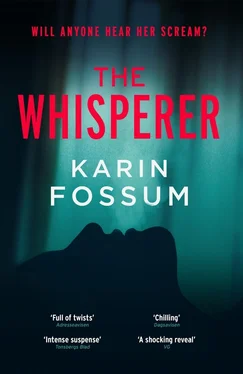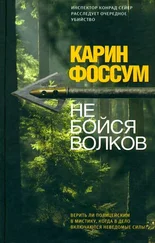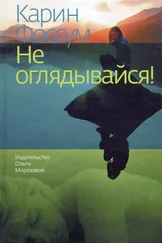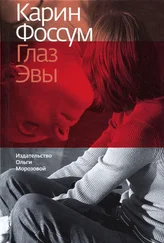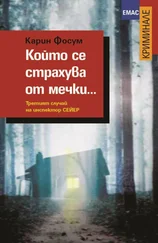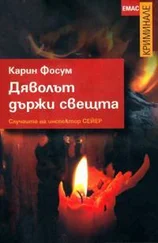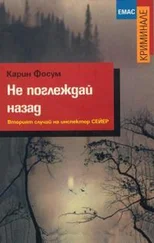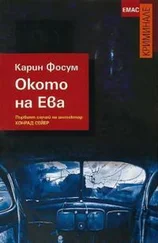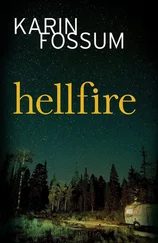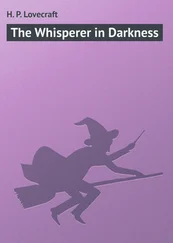Karin Fossum
The Whisperer
Monsieur Ernest Coméliau
Examining Magistrate
22 bis rue de Seine
Paris (VII)
Your Honour:
I should like one man, just one, to understand me. And I would like that man to be you.
We have spent many long hours together during all the weeks of the preliminary investigations. But at the time it was too soon. You were a judge, you were my judge, and I would have seemed to be trying to justify myself. But now you know, don’t you, it has nothing to do with that?
Georges Simenon,
Act of Passion, 1947
She wasn’t beautiful, and she was of course perfectly aware of it. She moved timidly across the floor in the way that most shy women do, with an apologetic expression. With no desire to take up space, no hope of making an impression or being believed, or, for that matter, being taken seriously at all. For well over forty years the mirror had taunted her about this lack of beauty, and she had bowed her head and accepted the judgement. If a spark had come blowing on the wind, she would presumably have gone up in flames — her hair was as dry as straw and she was pale as paper. She was wearing a green nylon coat, with big, deep pockets that contained nothing, as they had long since been searched and emptied. There was a logo on the breast pocket, over her heart, with the word ‘Europris’ embroidered in big letters. She had an ugly scar across her throat, left by a wound that had not healed well. She was underweight and perhaps anaemic, with red hair and freckles. And yet, despite her lack of colour, the blood was still coursing through her veins, especially now that she was standing in front of him, there to explain herself. Her hands hidden in the thoroughly inspected coat pockets. She was waiting for permission to sit down, was not presumptuous enough to make herself comfortable. Sejer had questioned many people over the years, but no one like her.
She pulled the chair out carefully, so it would not scrape on the floor — the noise might bother someone. She had never had anything to do with the public prosecutor before, must not irritate or provoke him in any way, make him angry. Only now did she notice the inspector’s dog over by the window; it stood up and padded across the floor. The dog, Frank Robert, was a small, fat Shar Pei and rather charming with all his wrinkles and folds, as if he was wearing a far too big coat, like herself. The dog stood up on his hind legs and laid his heavy head on her lap. His eyes, which were barely visible in among all the folds, instantly touched something in her and made her forget the seriousness of the situation. There was a small flash of joy in her own eyes, a glimpse. Her eyes lacked colour as well, the irises were pale and watery, and her eyebrows were thin as whiskers. She had not expected a dog. Certainly not one that would come up to her like that, devoted, without hesitation. She was not used to prompting such feeling, not from man or beast. As the beggar he was, Frank stayed on his hind legs and slavered on her coat. When she stopped patting him, he put his paw on her lap, hoping for more.
‘Frank,’ Sejer said. ‘Lie down.’
The dog padded back to his blanket. He pushed and pulled it with his paws to make a nest. The excess kilos slowed him down, and each command from his owner had to be interpreted and carefully assessed before it was obeyed, so everything took time. He was also getting on, in dog years. His sight, hearing and movement were all much reduced.
‘Let’s not make this too formal,’ the inspector said. ‘My name is Konrad.’
He held out his hand.
‘Ragna,’ she whispered. ‘Riegel.’
‘Like the chocolate,’ Sejer said with a smile. ‘I used to like their chocolate when I was a boy, and a bar only cost thirty øre. Everyone could afford a Riegel.’
As soon as he had said it, he realised it could be misinterpreted, but his words made her smile and the ice was broken.
Her hand, thin and white, rested in his for a moment. He noted the lack of strength. It was warm and dry, but there was no sign of nervousness, even though she was quick to lower her eyes. Their handshake was the first step towards something inevitable. Everything that needed to be talked about, explained and understood.
She snuck a glance at him and was reminded of old, impregnated wood or a log on a river, something heavy and solid. He was a good deal older than her, tall and grey. Dressed in a plain shirt with a dark blue tie. There was a cherry with two green leaves embroidered on the tie. That wasn’t sewn in a factory, Ragna thought. Someone, presumably a woman, had sat with a needle and thread and embroidered that cherry as a token of love.
‘You’re trying to win my trust,’ she whispered. ‘You won’t say a word about why I’m here, not for a long time. You’ll warm me slowly until I pop like popcorn in a pan. Turn myself inside out.’
‘Trust would be a good thing,’ Sejer said. ‘Is that what you want?’
Ragna had not hoped for anything. The police wanted a confession, and when they had that, they could charge her and have the case tried in court. And concentrate on the next investigation.
‘Yes,’ she whispered. ‘Trust would be good.’
He knew that she did not have a voice. She had lost it a few years earlier during an operation on her throat, which should have been a standard procedure, but instead had had serious consequences and permanently damaged her vocal cords. The wound had not healed well either, so she was left with a course, jagged scar that was red and clearly visible. He guessed that she often hid it with a scarf or a polo-neck sweater. She had not bothered now. Her bare, scarred neck was part of her explanation. Even though she could only whisper, he had no difficulty in understanding her. Ragna was more articulate than most. She used the muscles in her face, formed the words well with her tongue and lips. And Sejer quickly adapted to the situation. He used all his senses, read her lips and watched her expressions, something he generally did when questioning someone. It struck him that sitting here like this, facing someone who had a story to tell about fear and anger, or a dangerous opponent, or self-defence, some great accident, a burning hate, still excited him, despite his age. A childhood memory popped up. When he was a young lad and they used to lay into each other in the playground, they would then pipe up to any teacher who came to reprimand them: ‘He started it.’
‘Ragna,’ he said in a serious tone, ‘you have been held on remand for forty-eight hours now. And you will be held for four weeks, in the first instance, then for another four weeks, then it will be extended again and again. Can you cope with that?’
‘Oh yes,’ she whispered.
‘Are you able to call the officers or make contact if you need anything? Even though your request may be refused?’
‘I don’t need anything. I get food and drink. I have my own duvet. A bit like Frank.’
She nodded at the dog.
‘He obviously gets more than he needs,’ she said, alluding to his extra weight.
This little audacity was accompanied by a good-natured smile, perhaps a small dig in return for his comment about the chocolate.
‘I know that you don’t have any family,’ Sejer said. ‘Or am I wrong?’
‘I have a son,’ Ragna replied swiftly. ‘In Berlin. But he never comes home. He doesn’t have a family either, as he runs a hotel. I usually get a card from him for Christmas and my birthday. I was only seventeen when I had him.’
‘What’s his name?’
‘Rikard Josef.’
‘And his father?’
She shook her head.
‘Why doesn’t your son come home?’
Читать дальше
